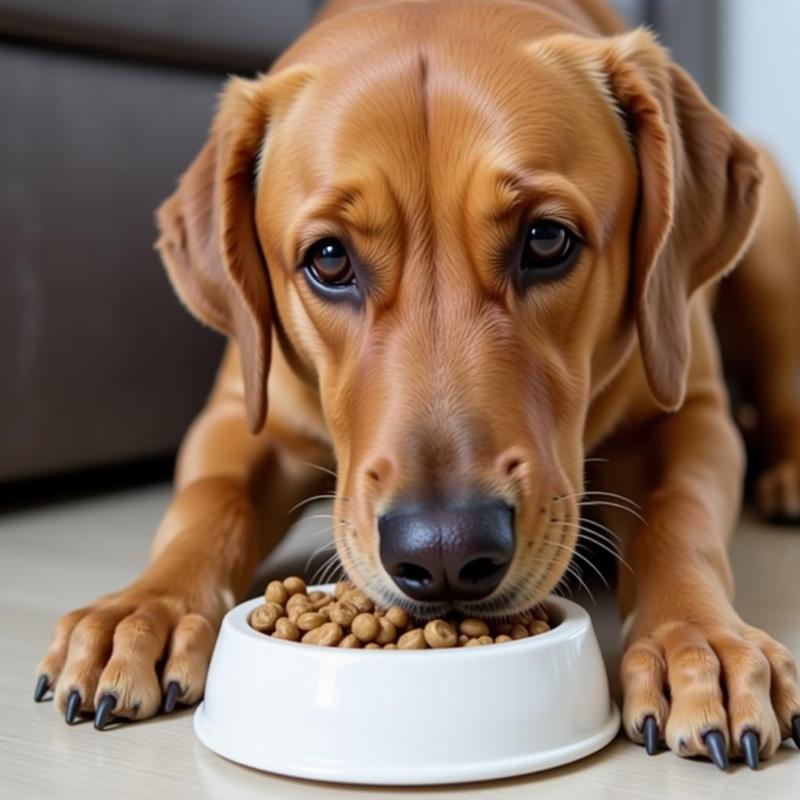Labrador Retrievers are beloved family dogs known for their playful nature, intelligence, and, let’s be honest, their love of food! Choosing the best dog food for your Lab is crucial for their health, energy levels, and overall well-being. This guide will cover everything you need to know about selecting the perfect food to keep your Labrador happy, healthy, and at their best.
Understanding a Labrador’s Nutritional Needs
Labs are active dogs, and their dietary needs reflect this. They require a balanced diet rich in protein for muscle development and maintenance, healthy fats for energy and coat health, and carbohydrates for sustained energy. Additionally, essential vitamins and minerals are vital for supporting their immune system, bone health, and overall bodily functions. What works for a Chihuahua certainly won’t cut it for a Lab!
 Labrador Retriever Enjoying a Meal
Labrador Retriever Enjoying a Meal
Key Nutrients to Look for in Labrador Food
When browsing dog food aisles, focus on these key nutrients:
- Protein: Look for high-quality animal-based protein sources like chicken, beef, lamb, or fish. This provides the building blocks for strong muscles.
- Fat: Healthy fats from sources like fish oil and chicken fat support a glossy coat, healthy skin, and provide energy. Avoid excessive fats, which can lead to weight gain.
- Carbohydrates: Provide sustained energy. Look for digestible sources like brown rice, sweet potatoes, or oats.
- Vitamins and Minerals: Essential for overall health and well-being. Look for foods fortified with vitamins A, C, D, E, and minerals like calcium and phosphorus.
Life Stage Considerations for Labrador Feeding
A puppy’s nutritional needs are different from an adult or senior dog.
Puppy Food (Up to 1 Year)
Labrador puppies require food specifically formulated for growth. Puppy food is typically higher in calories and protein to support rapid development.
Adult Food (1-7 Years)
Once your Lab reaches adulthood, switch to an adult formula. best dry dog food for a labrador This provides balanced nutrition for maintaining a healthy weight and energy levels.
Senior Food (7+ Years)
As your Lab enters their golden years, consider switching to a senior formula. These formulas are often lower in calories and higher in fiber to support the needs of an aging dog. best dog food for older labs They may also include ingredients to support joint health, a common concern in older Labs.
Common Labrador Health Issues and Dietary Considerations
Labs are prone to certain health conditions, and diet can play a crucial role in managing these:
- Hip and Elbow Dysplasia: These genetic conditions can be exacerbated by excess weight. Choosing a food that helps maintain a healthy weight is crucial.
- Obesity: Labs love to eat, so portion control is essential. Look for foods that promote healthy weight management.
- Allergies: Some Labs are prone to food allergies. If you suspect your Lab has allergies, consult with your veterinarian.
Choosing the Right Brand of Dog Food
With so many dog food brands on the market, making a choice can be overwhelming. Look for brands that meet the Association of American Feed Control Officials (AAFCO) standards. Prioritize quality ingredients, avoid artificial flavors and colors, and consider your Lab’s individual needs. Don’t be swayed by fancy marketing; focus on the nutritional content.
What is the best dog food for a Labrador puppy?
Puppy food specifically formulated for large breeds, high in protein and calcium, is best.
What should I feed my senior Labrador?
A senior formula with lower calories and added joint support is ideal for older Labs.
Conclusion
Choosing the best dog food for a Labrador involves understanding their specific nutritional needs, considering their life stage and any health concerns, and focusing on quality ingredients. By making informed choices, you can ensure your Lab receives the nourishment they need to thrive throughout their life. Remember, a healthy diet is an investment in your Lab’s happiness and well-being.
FAQ
- How much should I feed my Labrador? Follow the feeding guidelines on the dog food packaging and adjust based on your dog’s activity level and weight.
- Can I give my Labrador table scraps? While tempting, table scraps can be unhealthy and contribute to obesity. Stick to dog food formulated for their needs.
- What are signs of a food allergy in my Lab? Itching, skin irritation, digestive upset, and ear infections can be signs of a food allergy. Consult your veterinarian.
- Should I feed my Lab wet or dry food? Both wet and dry food can be part of a healthy diet. Consider your dog’s preferences and dental health.
- How often should I feed my Labrador? Most adult Labs do well with two meals per day.
- Is grain-free dog food good for Labradors? Consult your vet as some recent studies suggest a link between grain-free diets and heart conditions in dogs.
- What treats are safe for Labradors? Look for treats made with natural ingredients and avoid those with artificial flavors and colors.
Beautdogs.us is your premier source for all things dog-related in the US. We offer expert advice on dog breeds, care, and products. Whether you’re a new dog owner or a seasoned pro, Beautdogs.us is your trusted resource. Contact us for more information at [email protected] or +1 501-555-7529. Visit us online at Beautdogs.us!